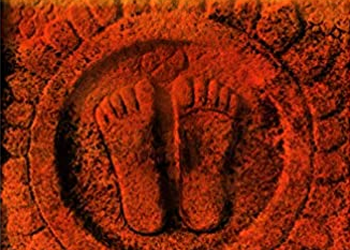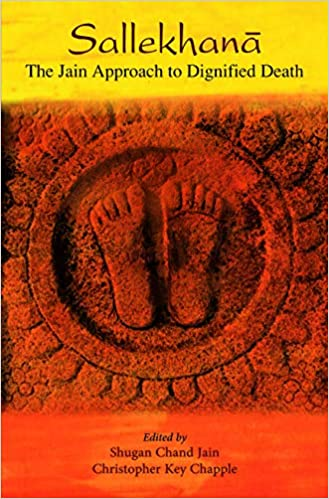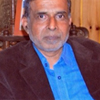Âcârya Amritchandra in Puru artha-siddhyupâya avers:
- When death is imminent, the vow of sallekhanā is observed by progressively slenderizing the body and the passions. Since the person observing sallekhanā is devoid of all passions like attachment, it is not suicide.
- When a man, actuated by passions, puts an end to his life by means of stopping breath, or by water, fire, poison, or weapon, he is certainly guilty of suicide.
- In the observance of sallekhanā, since passions, the instrumental cause of himsâ, are subdued, sallekhanā is said to be leading to ahimsâ.
Excerpted from: Jain, Vijay K. (Ed.) (2012), “Shri Amritchandra Suri’s Puru artha-siddhyupâya – with Hindi and English Translation”, Vikalp Printers, p. 115-116.
All worldly souls (samsârî jîvas) are embodied according to their individual spiritual status and are subject to the cycle of birth and death. The body, associated with each soul, is subject to growth, old age, decay, and death. Death entails that the soul must quit the existing body to acquire a fresh body consistent with, and determined by, the record of the karmic conditions, of which the soul itself is a repository. One of the most contentious issues in metaphysics is the relationship between the soul and the body. The Jaina metaphysics holds that the two are entirely different entities but live together for a certain period of time and then depart.
From the point of view of the modes in bondage, owing to the influence of karmas, the soul is corporeal in the embodied state. From the point of view of its pure nature, the soul is incorporeal. Though the soul is one with the body in the embodied state, it is different from the body because of its distinctive characteristics. The corporeal nature of the soul is predicated in the non-absolutistic or relativistic sense only. From one point of view, the soul is incorporeal, but from another point of view, it is corporeal. A person is deluded when he identifies an animate object, soul (jîva), as inanimate, and an inanimate object, non-soul (ajîva), as animate. A deluded person breeds attachment to the body which is intimately bound to him, and with persons or objects like friends, clothes, houses, riches, and geographical territories, which are not so bound to him. He desires their possession, ownership and company, and their separation brings about grief to him. He spends his whole life in acquiring and then protecting them, and their inevitable separation causes unbearable misery to him. He lives under the fear of death.
All human beings who have not met with an untimely death pass through eight experiential stages in life – birth, infancy, childhood, adolescence, youth, adulthood, old age, and death. We are mostly dependent on others till we reach the stage of youth. In these formative years, most decisions pertaining to our upbringing are taken by others. As we reach adulthood, we become aware of our inherent likes and dislikes, strengths and weaknesses, and start pondering over matters like our objectives and goals in life. We take decisions on our career, family, and social life. By the time we reach the stage of advanced adulthood we have enough experience to look back and vision to look forward. We are mature enough to understand the meaning of life, its pleasures and pains. We are able to observe the ups and downs in the lives of people around us. More importantly, we are able to reflect on whether there is something we must do regarding the direction of our life, or live life just as it comes.
In our worldly life we seek pleasure and try to avoid pain and suffering. No sooner do we make headway in acquiring, and then using an object of pleasure, than a feeling of its inadequacy creeps into our mind. We want something superior in terms of both, the quality and the quantum of pleasure. We become slaves of pleasure. Typically, we over-indulge at night, get a terrible hangover the next morning, but crave for the same thing again at the fall of night. We get overpowered by the senses and become addicted to pleasure. As the harmful effects of this addiction on our mind and body surface in due course of time, the realization dawns that perhaps we have moved too far ahead in the wrong direction. We get disheartened to see that pleasure is short-lived and is followed, sooner or later, by pain and suffering. Despondency sets in; we wish to do something about it, but it is too late by then. The stark reality that we must leave behind, voluntarily, all material possessions, strikes in our face. There is no escape from this plain truth; if we do not volunteer to do it ourselves, death will perform the act for us, rather ruthlessly. The idea of separation from our prized possessions leaves us in great pain and misery. Enjoyment of a few pleasures in the past is no solace to a grieving soul. Realization of this basic truth early in life can save us from much hardship and agony later on.
Wise men start looking at the realities of life and ways to cope with these as soon as the realization dawns that they have just one or two score years of the present life left. They clearly apprehend that the worldly existence is full of misery; disease, old age, separation from kith and kin, accident, natural disaster, failure, and death are but some of the realities of life that one must run into. They take corrective actions to make the best use of the remaining years. While they commiserate with people living in conditions of poverty, deprivation, impairment, or disease, they do not allow despondency to set within themselves. They are not particularly attracted towards the pleasures that worldly objects have to offer. They realize that pain and suffering are inextricably linked to the worldly life and are attributed to our karmas.
Our virtuous karmas in the past have provided us with whatever good and enjoyable things we have in this life and we must now make efforts to engage ourselves only in actions that will provide us with joyous feelings in the remaining years of this life, and the next.
When a man turns his consciousness exclusively to the Ideal of the pure soul, he is saved from indulging in activities that result in perennial entrapment in the world. Knowing the body as unconscious, mortal, and a product of karmas, one who does not undertake activities pertaining to the body performs the essentials of detachment from the body. The soul has the intrinsic attribute of darting upward and the body, being physical matter, is an instrument of pulling the soul downward. The body, being a direct outcome of karmas, is absolutely worth dissociation and detachment for anyone who is treading the path to liberation. Only with such discrimination between the soul and the body can one develop interest and inclination towards the soul and disinterest and disinclination towards anything that is antithetical to the soul.
The way to make human birth meaningful is through renunciation of worldly pleasures, meditation, austerities, propagation of true faith, and finally attaining a pious and passionless death by relinquishing the body through the method of sallekhanâ.
This article is based primarily on excerpts from “Âcârya Pujyapâda’s IÈÇopadeúa – The Golden Discourse”, Vikalp Printers, Dehradun. Jain, Vijay K. (2014),




Thanks for sharing. I read many of your blog posts, cool, your blog is very good.